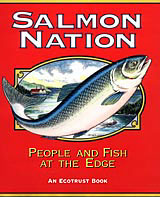Climate Food and Agriculture
All Stories
-
It's Report-Card Time
The timing is unbearable. Here on my desk in the middle of the blooming, buzzing month of May is the best report yet on the state of the world’s ecosystems. Best not because it contains good news — it doesn’t — but because it’s short and clear and blunt. The report evaluates the health of […]
-
Do we know enough about genetically modified foods?
Genetically modified foods — you’ve heard about them, but you probably don’t know whether you’re eating them. They’re produced by splicing genes, those little segments of DNA that code for particular traits, from one plant or animal species and inserting them into another. Biotechnology companies are cooking up all sorts of techniques to engineer organisms […]
-
Bean Counting
3,300 — number of cups of coffee that are consumed each second worldwide 6.3 million — metric tons of coffee produced in the world in the 1999-2000 crop year 25 million — number of farmers who grow coffee worldwide, the majority on small-scale farms 600-800 AD — the era in which an Ethiopian goat herder […]
-
Let's Look Before We Leap into Biotech
Biotech stocks plummeted last week as President Clinton and British Prime Minister Tony Blair requested that companies make their data on the human genome public. Private firms are racing madly to read and patent the genetic code that makes you you and me me. They are trying to beat publicly funded labs, which are required […]
-
More Than Meats the Eye
8 pounds of grain are needed to produce one pound of beef 2,464 gallons of water are needed to produce one pound of beef 40 percent of grain is fed to livestock, poultry, or fish China’s grain consumption increased by 40 million tons between 1990 and 1995 — and 33 million of those tons were […]
-
Do you know where your salmon comes from?
Thirty percent of the world's salmon now come from hatcheries, but wild fish account for only another twenty to thirty percent. Almost all of those wild fish come from waters around Alaska and British Columbia, northern waters where runs are mostly intact. These are the waters from which we harvest volumes comparable to those native people caught for thousands of years, that is, in those places largely unmanaged. The biggest share of the world's salmon consumption, however -- now forty to fifty percent -- comes from farmed fish, salmon raised and fed artificially in net pens their entire lives.
-
The Mod Squad
Delegates from more than 130 nations on Saturday adopted the first global treaty regulating trade in genetically modified products, the first time that environmental concerns and trade rules have been reconciled in an international agreement. The treaty allows countries to bar imports of genetically modified seeds, crops, and animals, even if scientific studies have not […]
-
Pork Politics
“Campaign reform” is much too polite a phrase. “Ending corruption” is more like it. I could — and maybe I will — write a column a week from now till next fall’s election counting the ways campaign contributions corrupt our government, destroy our public assets, and rob taxpayers. Today’s example is industrial hog farming. This […]
-
In Other Words …
A while ago I wrote a column full of solemn statements from august scientists and other wise persons, warning that we are trashing our planet at a sickening pace. The august persons didn’t say “trashing” or “sickening.” They spoke of “adverse consequences” and “significant geopolitical risk.” An Alert Reader (to steal a phrase from Dave […]
